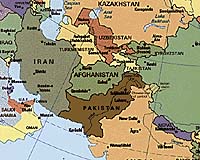 |
Amara, Iraq (AFP) Dec 21, 2009 Iranian troops remained inside Iraq territory on Monday despite pulling back from an oil well along the two countries' disputed frontier, a local politician told AFP. Oil ministry spokesman Assem Jihad, meanwhile, said the oil well had not yet been developed and that no Iraqis had worked to extract crude from it before Iran took it over last week. "The Iranians withdrew from the well and took down the Iranian flag," Mayssam Lafta, the Maysan provincial council member charged with security and defence, told AFP. "But they are still on Iraqi soil." The well, known as Oil Well 4, is situated in Maysan. According to Lafta, the Iranians are positioned 50 metres (yards) east of the well, while Iraqi forces are "surrounding the well." The oil ministry spokesman said the well had "not been developed" and added that no workers would be going to it because it was not in use. Iraqi officials say the well lies 100 metres (yards) inside Iraqi territory. Iran insists it lies on its side of the border. On Friday, an official of Iraq's state-owned South Oil Company in the Maysan provincial capital Amara said that a dozen Iranian troops and technicians had arrived at the field, taken control of Well 4 and raised the Iranian flag. One SOC employee spoke of how he and his colleagues had faced harassment and intimidation from Iranian forces for several years on visits to the well. "Usually when we have gone there, we have gone as a group, with engineers and technicians," said Hassan Abu Qassim, a 40-year-old SOC technician. "Iranian forces would shout in our direction when we go there, to make us afraid, and warn us not to approach. The last time we went was in the summer, and the Iranians shouted at us and did not want us to go nearby." It was the first serious incident between the two neighbours since the US-led invasion of 2003 toppled now-executed dictator Saddam Hussein's regime, which fought a devastating 1980-1988 war against Iran. Many leaders of Shiite parties who were exiled in Iran during the Saddam era are now in power in Baghdad. Well 4 is in the Fauqa Field, part of a cluster of oilfields which Iraq unsuccessfully put up for auction to oil majors in June. The field has estimated reserves of 1.55 million barrels. The tensions between the two oil producing countries come as OPEC readies for a meeting in Angola on Tuesday. Share This Article With Planet Earth
Related Links Powering The World in the 21st Century at Energy-Daily.com
 Gas pipeline a symbol of China's rise in C.Asia: analysts
Gas pipeline a symbol of China's rise in C.Asia: analystsBeijing (AFP) Dec 20, 2009 China has quietly rewritten the geopolitical landscape in Central Asia in recent years, breaking Russia's monopoly over the export of the region's energy resources also coveted by the West, experts say. The proof came last week when Chinese President Hu Jintao travelled to the region for the inauguration of a natural gas pipeline snaking from Turkmenistan through Kazakhstan and Uzbekistan in ... read more |
|
| The content herein, unless otherwise known to be public domain, are Copyright 1995-2009 - SpaceDaily. AFP and UPI Wire Stories are copyright Agence France-Presse and United Press International. ESA Portal Reports are copyright European Space Agency. All NASA sourced material is public domain. Additional copyrights may apply in whole or part to other bona fide parties. Advertising does not imply endorsement,agreement or approval of any opinions, statements or information provided by SpaceDaily on any Web page published or hosted by SpaceDaily. Privacy Statement |